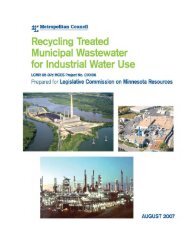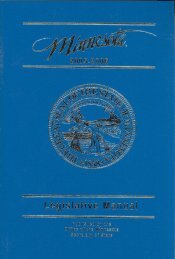Soil & Water Conservation District Guidebook 2008 - Minnesota ...
Soil & Water Conservation District Guidebook 2008 - Minnesota ...
Soil & Water Conservation District Guidebook 2008 - Minnesota ...
You also want an ePaper? Increase the reach of your titles
YUMPU automatically turns print PDFs into web optimized ePapers that Google loves.
Judicial Ditch 10 wetland restoration<br />
This project (pictured) restored two large drained wetland basins<br />
along the upper reaches of the JD 10 drainage system. The system<br />
drains approximately 2,920 acres of land before emptying into nearby<br />
Rice Lake in northwestern Faribault County. The state of <strong>Minnesota</strong>,<br />
through the Board of <strong>Water</strong> and <strong>Soil</strong> Resources, working with the<br />
Faribault County SWCD, local drainage authority, and several<br />
landowners partnered on this project. The intended functions of the<br />
project are fl ood control, drainage system improvement, improved<br />
water quality, wildlife habitat, and improved drainage benefi ts for<br />
this public drainage system. The project was an alternative to a major<br />
repair or drainage improvement of the JD 10 system. BWSR, through<br />
the CREP program, secured four perpetual conservation easements<br />
from two landowners covering 156 acres to facilitate this project.<br />
‘Guide To Rural Living’ This website educates new,<br />
existing, and potential rural homeowners within Faribault County<br />
on the rules and regulations that exist regarding rural living. The<br />
website, produced by the SWCD, addresses some of the many<br />
concerns and issues that rural residents face, such as zoning,<br />
building, septic systems, wells, solid waste, etc. Individuals<br />
looking at building or purchasing a home in a rural setting need to<br />
be informed of factors to consider. In providing this information<br />
prior to purchase, the SWCD hopes to minimize after-the-fact<br />
issues, concerns, and problems.<br />
A joint powers agreement between the SWCD and<br />
Faribault County’s Planning and Zoning Department allows for<br />
stable funding for Comprehensive Local <strong>Water</strong> Management<br />
Planning. The SWCD is also the county water plan coordinator<br />
Faribault County <strong>Soil</strong> & <strong>Water</strong> <strong>Conservation</strong> <strong>District</strong><br />
and recently completed the 2007-2016 Local <strong>Water</strong><br />
Management Plan.<br />
Rock Tile Inlets have been installed by<br />
the SWCD in recent years through its Alternative<br />
Tile Inlet Program. Various funding sources have<br />
contributed to the success of this program, which<br />
provides an alternative to traditional open intakes and<br />
provide multiple water quality benefi ts.<br />
Top 5 Natural Resource Concerns<br />
1.<br />
2.<br />
3.<br />
4.<br />
5.<br />
<strong>Water</strong> quality concerns (surface, ground,<br />
lake watershed, wastewater, non point source<br />
pollution)<br />
Stormwater management including<br />
stormwater control, LID and fl ood damage<br />
reductions<br />
Drainage management including agricultural<br />
fl ood damage reduction, public drainage and<br />
water retention<br />
Erosion control (soil, streambank and construction<br />
site)<br />
Agricultural concerns (animal agriculture,<br />
manure management, nutrient management)<br />
Future Projects<br />
Urban Outreach Specialist - Faribault County<br />
SWCD received grant funding through the Clean<br />
<strong>Water</strong> Legacy and the 319 funding programs<br />
to hire an Urban Outreach Specialist to assist<br />
the communities of Faribault County with their<br />
stormwater needs. This position was created in<br />
response to the impaired waters issue, and the<br />
contribution of urban runoff to the problem. The<br />
SWCD is currently working with city staff, elected<br />
offi cials, and street supervisors to identify the needs<br />
of each community and determine the best way to<br />
assist them in their stormwater efforts. The cities will<br />
all be taking part in a campaign to raise awareness<br />
about basic water quality problems and solutions.<br />
The urban outreach effort will include initiating and<br />
designing some projects to demonstrate the use of<br />
innovative stormwater management techniques, and<br />
bringing training opportunities on best management<br />
practices, LID, NPDES permitting, and other topics.<br />
47
















